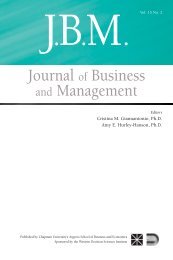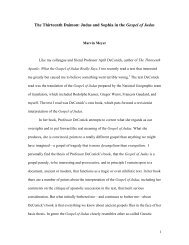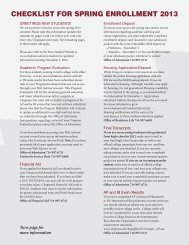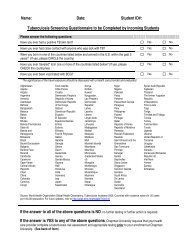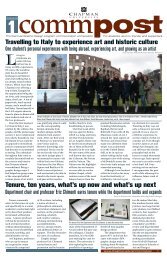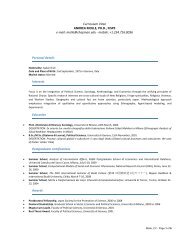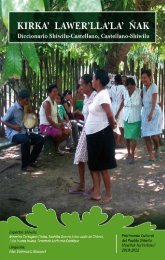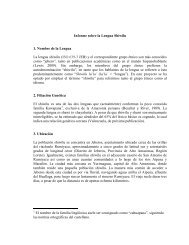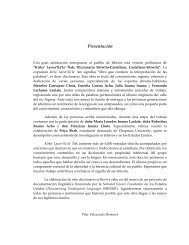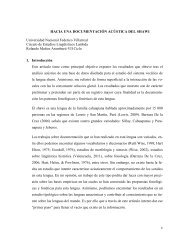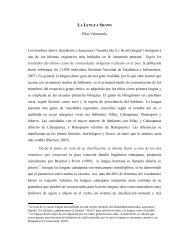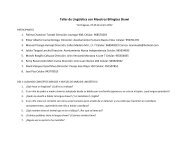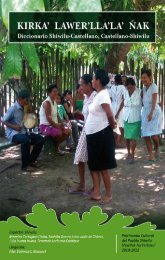“Surplus Humanity” and the Margins of Legality - Chapman University
“Surplus Humanity” and the Margins of Legality - Chapman University
“Surplus Humanity” and the Margins of Legality - Chapman University
You also want an ePaper? Increase the reach of your titles
YUMPU automatically turns print PDFs into web optimized ePapers that Google loves.
Do Not Delete 12/12/2010 7:34 PM<br />
12 <strong>Chapman</strong> Law Review [Vol. 14:1<br />
coercion made capital accumulation possible. 82 Coercion<br />
triggered <strong>the</strong> genesis <strong>of</strong> capitalism—availability <strong>of</strong> ―free‖ labor<br />
with no o<strong>the</strong>r means <strong>of</strong> livelihood except <strong>the</strong>ir labor to be sold in<br />
a nascent ―free‖ labor market, <strong>and</strong> <strong>the</strong> availability <strong>of</strong> capital to be<br />
deployed in <strong>the</strong> incipient manufacturing industries. Historically,<br />
<strong>the</strong> process turned on ―ex-novo separation between producers <strong>and</strong><br />
means <strong>of</strong> production.‖ 83 The key issue here involves <strong>the</strong><br />
―conditions, circumstances <strong>and</strong> contexts in which this separation<br />
is enforced.‖ 84 Contrary to <strong>the</strong> mythologies <strong>of</strong> classical economics,<br />
this is a realm outside <strong>the</strong> market governed by pure economic<br />
laws—a zone where this separation is effectuated through direct<br />
extra-economic forces residing in <strong>the</strong> coercive power <strong>of</strong> <strong>the</strong> state<br />
<strong>and</strong> <strong>the</strong> law. 85 Two domains <strong>of</strong> extra-economic power were<br />
critical to this process: coercive laws that forced subsistence<br />
producers into <strong>the</strong> ―free‖ wage labor market, <strong>and</strong> colonial plunder<br />
that made capital available for investment.<br />
Colonialism, facilitated by an elaborate reordering <strong>of</strong><br />
international law, filled <strong>the</strong> c<strong>of</strong>fers <strong>of</strong> <strong>the</strong> fledgling mercantile<br />
class <strong>of</strong> Europe <strong>and</strong> generated <strong>the</strong> financial resources to engage<br />
<strong>the</strong> ―freed‖ labor in production governed by pr<strong>of</strong>it maximization. 86<br />
Besides direct plunder <strong>of</strong> resources in <strong>the</strong> colonies, agricultural<br />
l<strong>and</strong>s in <strong>the</strong> Americas <strong>and</strong> plantation colonies in <strong>the</strong> Caribbean<br />
82 As Polanyi reminded us, ―[t]he road to <strong>the</strong> free market was opened <strong>and</strong> kept open<br />
by an enormous increase in continuous, centrally organized <strong>and</strong> controlled<br />
interventionism.‖ KARL POLANYI, THE GREAT TRANSFORMATION: THE POLITICAL AND<br />
ECONOMIC ORIGINS OF OUR TIME 146 (2001). Jessop adds:<br />
[N]ei<strong>the</strong>r capitalism as a whole nor <strong>the</strong> capital-labor relationship on which its<br />
contradictory <strong>and</strong> conflictual dynamic depends can be reproduced purely<br />
through market relations. Both require supplementary modes <strong>of</strong> reproduction,<br />
regulation <strong>and</strong> governance[,] including those provided in part through <strong>the</strong><br />
operations <strong>of</strong> <strong>the</strong> state.<br />
BOB JESSOP, THE FUTURE OF THE CAPITALIST STATE 11 (2002).<br />
83 Massimo De Angelis, Separating <strong>the</strong> Doing <strong>and</strong> <strong>the</strong> Deed: Capital <strong>and</strong> <strong>the</strong><br />
Continuous Character <strong>of</strong> Enclosures, 12 HIST. MATERIALISM 57, 63 (2004).<br />
84 Id. at 66.<br />
85 Polanyi focuses on <strong>the</strong> role <strong>of</strong> state power in <strong>the</strong> commodification <strong>of</strong> l<strong>and</strong> <strong>and</strong><br />
labor, what he terms ―fictitious commodities.‖ POLANYI, supra note 82, at 71. He points<br />
out that capitalism ―was submerged in general social relations; markets were merely an<br />
accessory feature <strong>of</strong> an institutional setting controlled <strong>and</strong> regulated more than ever by<br />
social authority.‖ Id. at 70.<br />
86 For example, silver from <strong>the</strong> ―New World‖ roughly tripled Europe‘s supply.<br />
FERNAND BRAUDEL, II CIVILIZATION AND CAPITALISM, 15TH–18TH CENTURY: THE WHEELS<br />
OF COMMERCE 198 (Sian Reynolds trans., Univ. <strong>of</strong> Cal. Press 1992) (1979). For <strong>the</strong><br />
relationship between colonialism <strong>and</strong> international law, see Antony Anghie, Francisco de<br />
Vitoria <strong>and</strong> <strong>the</strong> Colonial Origins <strong>of</strong> International Law, in LAWS OF THE POSTCOLONIAL 89,<br />
89–91 (Eve Darian-Smith & Peter Fitzpatrick eds., 1999); Antony Anghie, Finding <strong>the</strong><br />
Peripheries: Sovereignty <strong>and</strong> Colonialism in <strong>the</strong> Nineteenth-Century International Law, 40<br />
HARV. INT‘L L.J. 1, 2–5 (1999); ANTONY ANGHIE, IMPERIALISM, SOVEREIGNTY AND THE<br />
MAKING OF INTERNATIONAL LAW 116–17 (2004); MARTTI KOSKENNIEMI, THE GENTLE<br />
CIVILIZER OF NATIONS: THE RISE AND FALL OF INTERNATIONAL LAW 1870–1960, at 98–178<br />
(2002).



